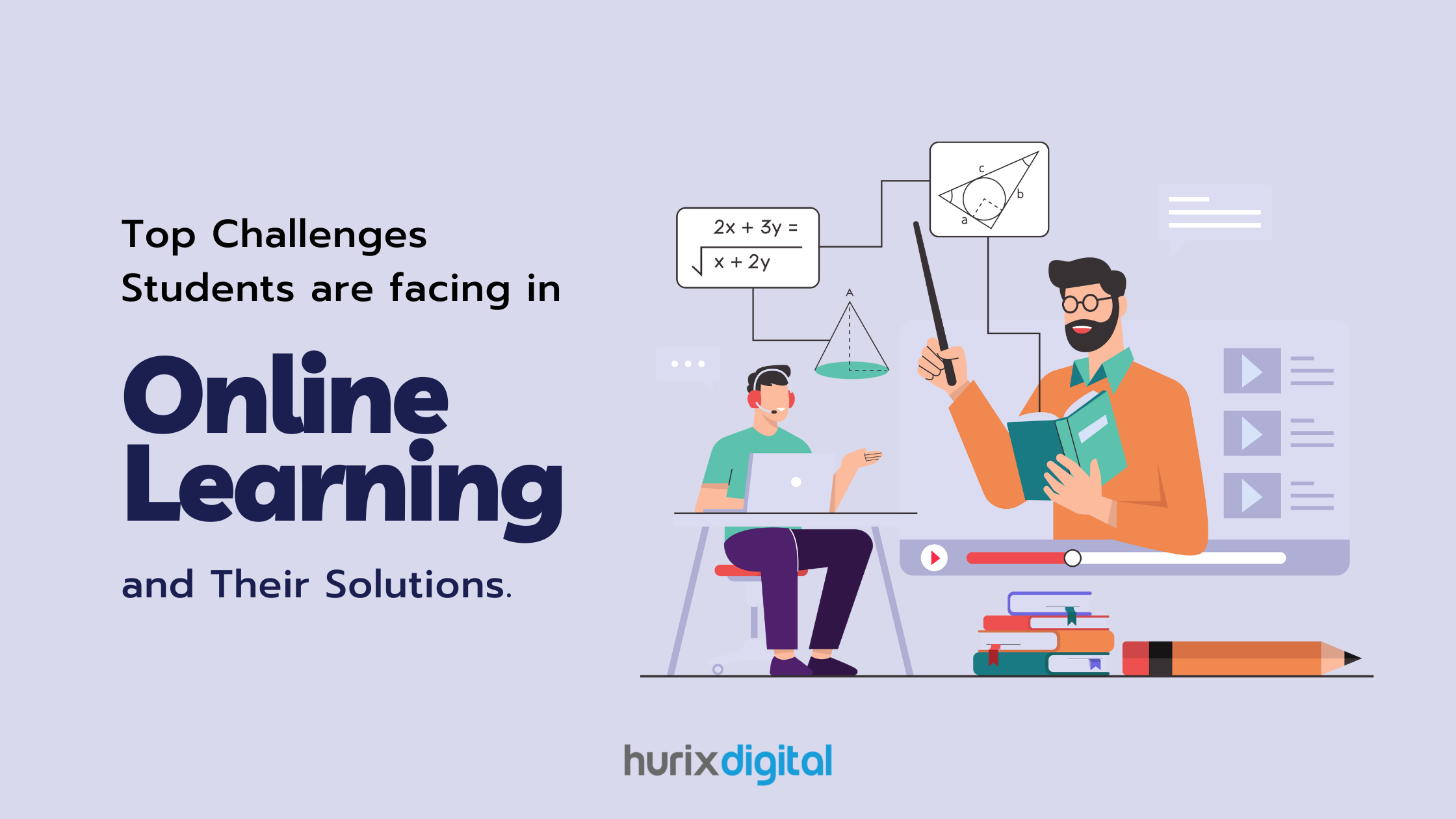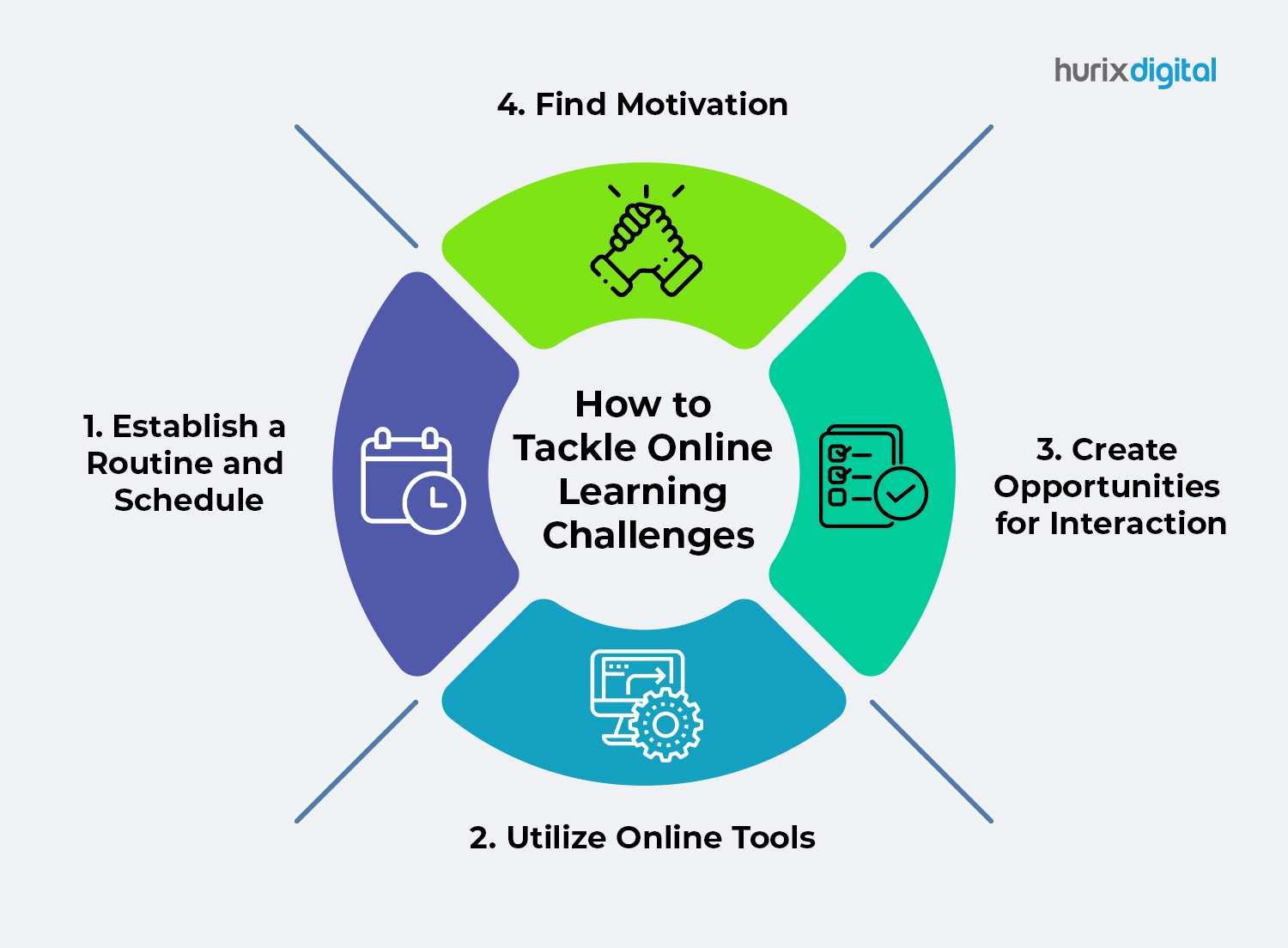
Online Learning for Students: Top 4 Challenges of Online Education and Their Solutions
Educational institutions are moving towards online learning modules. In addition, advanced digital learning tools are on the rise, with virtual learning paving the way for increased student engagement.
Of course, online learning has several benefits, such as video-based courseware, live teaching modules, online peer-to-peer discussion forums, and flexible class schedules. However, while there are ample strategies for successful online learning, it poses some significant challenges for students.
Table of Contents:
- Top 3 Online Learning Challenges Students Face
1. Technical Difficulties
2. Lack of Interaction with Peers and Instructors
3. Difficulty Concentrating - How to Tackle Online Learning Challenges?
1. Establish a Routine and Schedule
2. Utilize Online Tools
3. Create Opportunities for Interaction
4. Find Motivation - Conclusion
- Frequently Asked Questions (FAQs)
Top 3 Online Learning Challenges Students Face
The latest trend of e-learning is gaining attraction among learners even though learning hurdles can’t be ruled out. Here are 4 major online learning hurdles you should know:
1. Technical Difficulties
One of the issues in online learning is the need for strong and stable bandwidth internet connections. Unfortunately, home internet connections usually have lower bandwidth or sometimes have exhausted their limits. As a result, it may be challenging to log in for a class for students.
In some areas, the speed of the internet connection could be better. It will take a lot of work to locate and watch the course video. Apart from having a laptop or android mobile, having a reliable internet connection is essential to continue online learning.
A more robust internet connection is required to attend the online class, which is highly expensive for underprivileged students who need a laptop, desktop computer, or tablet. But these devices are not available cheaply, and they may be challenging to afford for low-income students.
If a student faces any technical issues on a physical campus, they might get help from the instructors. However, technical issues disrupt online learning and make the process tedious.
Hurix Mini-Book:
Immersive Learning for the WIN in Education!
2. Lack of Interaction with Peers and Instructors
Online learning involved expanding the boundaries of knowledge during the pandemic. However, isolation and lack of interaction are a couple of drawbacks for online students.
Some students may do well during isolation, but others may struggle to be alone. On the other hand, there are many opportunities for social interaction with peers and instructors in a traditional class. Interaction promotes bonds between the students and instructors, which may be one of the supportive attributes of the students.
3. Difficulty Concentrating
Even though online learning provides joy and convenience, it also comes with several distractions. Now a day, various digital platforms such as videos, blogs, and social media are loaded with more information. It is similar to smartphones and makes their lives easy but difficult to concentrate.
How to Tackle Online Learning Challenges?
Here are 4 methods to tackle online learning challenges:

1. Establish a Routine and Schedule
Having a routine and schedule of time helps to stay disciplined and focus on goals. If the students have busy schedules for 24 hours, they have to manage their routine tasks and times. They should find time to be active and relax. Students can multitask to manage time.
Students should list things to complete within the deadline and set daily reminders. In addition, avoiding distractions from social media, internet browsing, online gaming, etc., would help save time to focus more on the given course.
2. Utilize Online Tools
Students can utilize online tools and have more autonomy in making their schedule, and they can study whenever they feel convenient. This helps them to have control over their schedule and avoid distractions. You can encourage students to leverage online learning tools to explore career advancement opportunities.
3. Create Opportunities for Interaction
The absence of their classmates to discuss a topic or their teacher can make the students more frustrated. The instructors can overcome this problem. They can organize groups, forums, or webinars for the students to discuss questions and gather information. Even teachers can offer classes through face time.
Interactive sessions can be conducted using polls, live chat, games and more.
Also Read – 5 Effective Ways to Gamify Learning
4. Find Motivation
Lack of motivation is one of the major disadvantages for online learners. Students should be involved in positive talks, and this behaviour may help to maintain their focus firmly. In addition, instructors can compete with them and give rankings, prices, and certificates. It will make them engage in studies better.
They can be motivated further by using the study materials in a fun way by creating videos, making challenges, conducting quizzes, etc.
Know more, how to prepare K12 students for higher education
Conclusion
Hurix offers customized learning paths for higher education and K-12 institutions to enable student-friendly learning processes. Contact us to create a tailored online learning curriculum for your educational institution.
Frequently Asked Questions (FAQs)
1. How can students tackle the challenge of difficulty concentrating during online learning?
A. To improve concentration, students should minimize digital distractions and create a focused study environment.
2. Can you suggest methods for educators to promote interaction in online classes?
A. Educators can encourage interaction by organizing group activities, forums, webinars, and using interactive tools like polls and live chat.
3. What should students do if they encounter technical issues during an online class?
A. If students face technical issues, they should contact their instructors or technical support for assistance and consider offline access to course materials.
4. Are there any recommendations for maintaining a healthy work-life balance while studying online?
A. To maintain a healthy work-life balance, students should establish a routine, prioritize tasks, and find time for relaxation and physical activity.
5. How can instructors help motivate online learners effectively?
A. Instructors can motivate online learners by offering incentives, rankings, prizes, and interactive learning experiences such as quizzes and challenges.

Senior Vice President – Business Development
Over 25 years of experience in the edtech and workforce learning industry with strong skills in Business Development, Customer Relationship Management (CRM) and Strategy.











